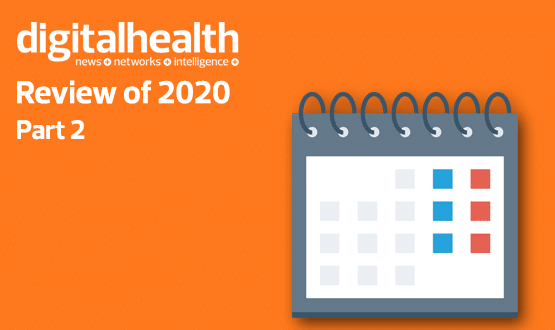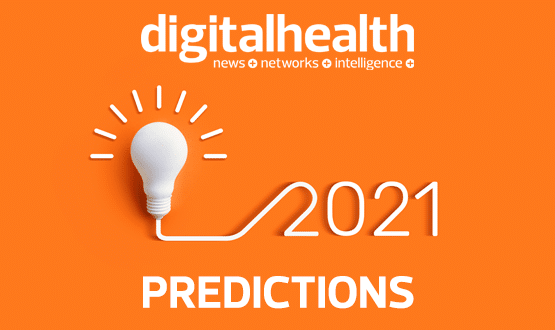Digital Health’s Review of 2020 Part Two: July to December
- 30 December 2020

Our round up of 2020 continues as we hit the second half of the year, when we saw the official launch of the NHS Covid-19 contact-tracing app across England and Wales along with Epic scooping up a number of NHS EPR contracts.

July saw the very first virtual Digital Health Summer School with highlights including the Shuri Network celebrating one year since it was launched and a discussion between the CIO and CNIO of NHSX.
Another popular session was a (very) early morning session about New Zealand’s digital response to Covid-19, where the deputy director for general data and digital at New Zealand’s Ministry of Health has said the coronavirus pandemic in the country had been a “wild ride”.
You can read some of our attendee’s highlights as well.
In the world of news, the top story was Dedalus announcing it was buying DXC Technology’s health business for a cool £413million.

With the British summer in full swing, you would think it would be a quiet time but August was when it was announced there would be a new trial for the revamped NHS contact-tracing app.
The trial began on 13 August and again involved the Isle of Wight as well as NHS volunteer respondents in the UK and residents from the London borough of Newham. The new app was based on Apple and Google’s decentralised model.
Another major story in August was Frimley Health NHS Foundation Trust awarding Epic with a multi-million-pound contract to provide an electronic patient record (EPR) solution.
According to the award notice, the £108million contract is to implement a “full integrated” EPR system.

After months of anticipation, September saw the official launch of the NHS Covid-19 contact-tracing app. At the time of the launch health secretary Matt Hancock said the app was “secure, simple to use and will help keep our country safe”.
It also proved to be costly and in the same month it was revealed the total cost of the app was expected to top £35 million. Some £25 million is expected to be spent this financial year on the new app, while a further £10 million was spent developing the original operating model that was abandoned in June.
Away from the contact-tracing app, in September 2020 we also reported on Barnsley Hospital NHS Foundation Trust going live with an electronic patient record powered by System C – replacing its contract with DXC Lorenzo.
The official go live was in July making Barnsley the first trust to migrate away from Lorenzo, which was the chosen service provider for the North, Midlands and East of England under the National Programme for IT.

The beginning of October saw an Excel blunder make national headlines when Public Health England (PHE) said that a “technical error” caused some 15,841 cases between 25 September and 2 October to be left out of daily figures.
It later emerged that the glitch was caused by an Excel spreadsheet, which contained lab results, reaching its maximum size and therefore preventing new cases from being added to the file.
Later in October, the head of NHS Test and Trace Baroness Dido Harding told parliament’s science and technology committee there was “at no time any risk to patient data”, adding that it is kept securely “in line with data protection regulations”.
October also saw Epic gaining another NHS customer when Guy’s and St Thomas’ NHS Foundation Trust announced the US supplier was its ‘preferred supplier’ for a new electronic health record (EHR).
The deal, worth around £175million, included a requirement for GPs to have direct access to the EHR, as well as having the option of linking up to King’s College Hospital NHS Foundation Trust and possibly Royal Brompton and Harefield NHS Foundation Trust.

Users of the NHS Covid-19 contact-tracing app came across some technical issues in November with reports suggesting that thousands of people were potentially unaware they may have been exposed to coronavirus.
A report by The Sunday Times suggested an error meant users whose “risk score” should have triggered an alert were not notified. This was because the app was set at the wrong sensitivity level.
November also saw NHS Digital penning a deal with DXC Technology and CSIRO, Australia’s national science agency, to help improve data sharing across different organisations.
The deal provides a single-supplier procurement framework that will give health and care organisations across the UK an efficient route to procure a terminology server.
It will allow buyers to share code system reference data from a central NHS Digital Terminology Server, enabling easier integration of local coding systems with national and international coding languages.

As we entered the final month of 2020 we saw the retirement of Digital Health Network pioneer, Professor Joe MacDonald.
Joe has been child psychiatrist for 30 years and is regarded as one of the country’s leading chief clinical information officers (CCIOs).
Darren McKenna, Joe’s colleague and CIO at Cumbria, Northumberland, Tyne and Wear NHS Foundation Trust recalled some key moments in Joe’s time as CCIO at the trust.
December also saw Digital Health Intelligence publish the annual NHS IT Leadership Survey which revealed most NHS IT leaders believe Covid has changed attitudes to digital.
NHSX CIO, Simon Eccles has also penned an op-ed for Digital Health on the report saying it was a “much needed shot in the arm at the end of an especially challenging year”.


